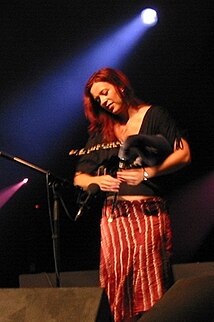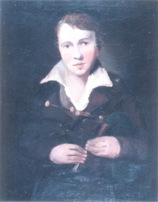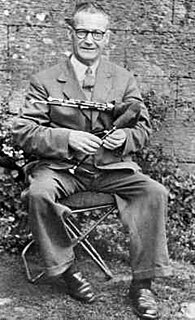
Kathryn Tickell, OBE, DL is an English player of the Northumbrian smallpipes and fiddle.
Here Northumbria is taken to mean Northumberland, the northernmost county of England, and County Durham, as is defined by the Oxford English Dictionary. This area, together with Tweeddale, was the ancient British tribal kingdom of Bernicia (Bryneich) and is notable for the stable ancestry of its present indigenous population, which has been identified by DNA analysis to be an offshoot of the group Scotland, Cumbria and the North of Ireland, but not so closely related to the other peoples of the UK. The area was the core of the outstanding artistic culture that developed during the Northumbrian Golden Age of the 7th and 8th centuries; it would be unwise to suggest that the area did not have a flourishing musical culture at that time, or that it was not of similar sophistication - Bede makes reference to the playing of the harp.
The Northumbrian Pipers' Society was founded to promote both types of Northumbrian bagpipes – the Northumbrian smallpipes and the half-long pipes, now generally known as the Border pipes. There had been several attempts to encourage the pipes and their music during the 19th century, but no society was formed with this specific aim until the Northumbrian Small Pipes Society in 1893. That society organised a series of competitions, in which Richard Mowat and Henry Clough were both prizewinners. However it was short-lived, dissolving around 1899. Today the society is divided into two branches, the main branch based in Morpeth, and the Cleveland branch based in Sedgefield.
John Peacock was one of the finest Northumbrian smallpipers of his age, and probably a fiddler also, and the last of the Newcastle Waits. He studied the smallpipes with Old William Lamshaw, of Morpeth, and later with Joseph Turnbull, of Alnwick.
Henry Clough (1855–1936), was a player of the Northumbrian pipes, or Northumbrian smallpipes. He was a miner, listing his trade as a hewer, and he lived in Newsham, in south-eastern Northumberland. He was the father of Tom Clough, 'The Prince of Pipers'. Several previous generations of the family had also been pipers, Henry's father, 'Old Tom' (1830-1885), and grandfather Henry (1789-1842) among them. Since the instrument assumed its modern keyed form at the beginning of the 19th century, the family's playing tradition goes back unbroken to that time. There is a photograph of Henry with his son at, while a photograph of Henry, his son Tom (III), and grandson Tom (IV) playing at Bellingham Show in 1926, is at.
Robert Reid (1784–1837) is widely acknowledged as the creator of the modern form of the Northumbrian Smallpipes. He lived and worked at first in Newcastle upon Tyne, but moved later to the nearby town of North Shields at the mouth of the Tyne, probably in 1802. North Shields was a busy port at this time. The Reids were a family with a long-standing connection to piping; Robert's father Robert Reed (sic), a cabinet maker, had been a player of the Northumbrian big-pipes, and an associate of James Allan, his son Robert was described later by James Fenwick as a beautiful player as well as maker of smallpipes, while Robert's son James (1814–1874) joined his father in the business. Robert died in North Shields on the 13th or 14th of January 1837, and his death notice in the Newcastle Journal referred to him as a "piper, and as a maker of such instruments is known from the peer to the peasant, for the quality of their tone, and elegance of finish". He is buried in the graveyard of Christ Church, North Shields. His wife Isabella died in 1849, of cholera. There were repeated outbreaks of the disease at this time especially in the poor 'low town', near the river, where the Reids lived.
Jack Armstrong (1904–1978) was an authoritative and influential performer on the Northumbrian smallpipes.
John Dunn was a noted pipemaker, or maker of bagpipes. Born in Newcastle upon Tyne, England, Dunn was a cabinet maker by profession, initially a junior partner with George Brummell. In the trade directories, he also appears in his own right as a turner and a plumb maker and turner. His address was Bell's Court, off Pilgrim Street. He was buried on 6 February 1820 in St. John’s, Newcastle. His father may have been one John Dunn of Longhorsley; if so, he was born on 3 September 1764. He should not be confused with one M. Dunn, the maker of several surviving sets of Union pipes.

Robert Elliot Bewick (1788–1849) was the son of the engraver Thomas Bewick. He was trained in engraving by his father, but is primarily remembered now as a player of the Northumbrian smallpipes.
Tommy Breckons (1928–2009) lived all his life on his family's Foundry Farm, Bellingham, central Northumberland. He was a noted player of the Northumbrian smallpipes.
The High Level Ranters are a Northumbian traditional musical group founded in 1964, best known for being one of the first bands in the revival of the Northumbrian smallpipes.
John Armstrong of Carrick was a farmer, huntsman, stick dresser and traditional musician from near Elsdon, in central Northumberland. His nickname refers to High Carrick, his hill farm on the edge of the Otterburn Army ranges, near Elsdon; Armstrong is a common name in the Borders. He claimed descent from the Border reiver Johnnie Armstrong of Gilnockie. His wife was descended from Muckle Jock Milburn.
Archie Dagg (1899–1990) was a shepherd and traditional fiddler, piper and composer from central Northumberland. He was born at Linbriggs, in Upper Coquetdale, and except for his time in the Army at the end of the First World War, lived all his life in that region. In the late 1930s, he was a member of the English Sheepdog Trials Team; when competing with them in Scotland, he would play Scottish tunes on the Northumbrian smallpipes, and found he would get a steady supply of free drams.
George Hepple (1904–1997) was an influential traditional Northumbrian fiddler. He was born at Sook Hill Farm, Haltwhistle, West Northumberland. He went to a nearby school in Melkridge. He began his working life as an apprentice blacksmith at Cawfield's Quarry at the age of fourteen, before moving to Ventners Hall Colliery where he remained until its closure in the 1950s. He then worked at Bardon Mill Colliery. He later worked in a plastics factory in Plenmellor, South of Haltwistle, until his retirement. In the last years of his life, he lived with his wife Edna in sheltered housing in Haltwhistle. At this time, he also had a pacemaker implanted and when the doctor said he should return to have the battery replaced, in 10 years, he replied "I don't need to worry about that then!".
John Forster Charlton (1915–89), was an English traditional musician, originally from near Hexham, Northumberland, who later settled in Gateshead. He at first played fiddle, but later also took up the Northumbrian smallpipes. He was a major figure in the folk music revival during the 1950s and 1960s, and an active member of the Northumbrian Pipers' Society. He was a founder member of the High Level Ranters, playing fiddle and smallpipes on their first record, Northumberland for Ever, but he subsequently left the group. Later he played in a country dance band, The Borderers.
Cornelius Stanton was a Northumbrian piper.




